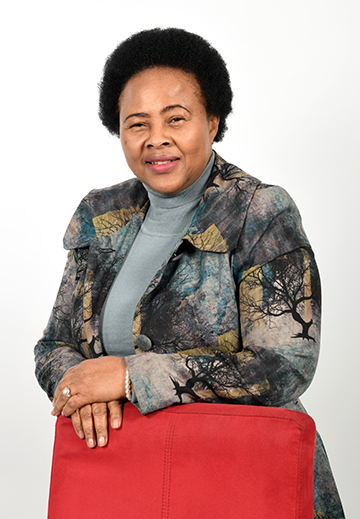News & Events
"Staff empowerment is the key to effective student support"
Based on her profound experience and ethical leadership style, an African woman of stature, Professor Zodwa Motsa Madikane, has been appointed as Unisa's new Vice Principal of Teaching, Learning, Community Engagement and Student Support (TLCESS). "I am truly honoured and humbled to head a portfolio within a university of such stature. It brings forward the magnitude and gravity of one's calling as an academic. I look forward to enhancing the production of quality graduates and for students to participate in academic exchange programmes worldwide," expresses Motsa Madikane.

Professor Zodwa Motsa Madikane
Motsa Madikane is the most recent former Executive Director of Unisa's Department of Leadership and Transformation and has held other leadership roles within and outside the university. These leadership roles include Head of Department at Hebron College of Education and then at the Medical University of Southern Africa. She was part of the university's leading team that created the curriculum for the Bachelor of Arts in siSwati, under the Department of African Languages. She later became Unisa's Chair of Department of English studies, before moving on as the Regional Director of the university's Ethiopia Regional Learning Centre in Addis Ababa.
Ready to serve, Motsa Madikane remarks: "We are here to ensure that the academic staff and the students experience the benefits of knowledge creation, dissemination, and assimilation. As a mega African university, the university has a responsibility to succeed in leading the academic agenda that responds to the needs of the diverse stakeholders it serves."
Unisa serves about a third of South Africa's population in higher education. The institution continues to offer a curriculum fit for purpose in the 21st century, ensuring that the hurdles of history and the political past are overcome.
A vision to elevate the academic agenda
The primary role of the TLCESS portfolio is to advance all academic matters related to teaching, learning, community engagement, and student support. Among others, the functionaries of the portfolio are academic planning, tuition support and the facilitation of learning, counselling and career guidance, and student support. The portfolio also ensures the proper representation of the university to the Department of Higher Education and Training (DHET), in support of the Principal and Vice Chancellor's (VC's) mandate.
The DHET encourages all universities to transform the spheres of knowledge, language, and culture to enable students to feel part of the university and not be marginalised in learning, language, and other essential aspects. For Motsa Madikane, staff empowerment is the key to adequate student support. She says that she will also attend to critical issues of social and epistemic justice on behalf of the VC. It is also in line with the expectation of the ministry of education for universities to ensure staff growth in the realm of black African women, who tend to be at the rear of most employment levels.
"The portfolio primarily works through the university Senate, the highest decision-making body on all academic matters. Additionally, the work behind the functionaries involves, among others, policy-making and application, curriculum development and implementation, programme accreditations, examinations, graduations, promotion of staff, and the advancement of ideas through research and teaching," she explains.
Motsa Madikane's primary vision is for the university to strategically produce quality graduates and add to the country's National Development Plan's economic force through the prescripts of Unisa's 2030 Strategy. She remarks: "My angle in advancing the academic project of the university is multi-tiered. First, I want to ensure that our unique colleges excel in their areas of specialisation." She adds: "It is inescapable to ensure that we keep our African-centred identity as part of our excellence. We need to relate with our students beyond their grievances."
Motsa Madikane acknowledges that all industrial revolutions are entwined to human history. "Ours is to examine them and establish how to survive the troughs they bring our way. As a teaching fraternity, we need to develop a skill set to enable our graduates to participate in gainful employment, locally and globally."
Overcoming challenges faced by African women in leadership
A thought leader in her own right, Motsa Madikane acknowledges the challenges faced by, especially African women in leadership, most of which she has experienced. These challenges include racism, patriarchy, and African female-on-African (gender-on-gender) attacks. She asserts: "Among other reasons, these are different permutations of a mega social disease, which I think is based on failure to accept others." She continues: "Within the workplace, I seldom think about my gender and often put my duties first, which keeps me focused. As a leader, I believe in investing in the core business of my employment such as publishing, supervising, teaching, and supporting young scholars, irrespective of their gender."
Motsa Madikane acknowledges God as the most seminal pillar of her survival and strength. She also acknowledges her late parents as her advisors, who provided a good perspective on things. Further, she appreciates her support structure, being her husband, children, and close relatives.
Expressing appreciation for the warm welcome that she receives from staff, management, students, and the university Council, she says: "Let us work together in the best interests of the success of the university." She concludes: "Both the girl-child and the boy-child are my stakeholders and my future leaders. Therefore, to all upcoming leaders, study, read, and excel in your field, as your leadership of self is the paramount base of your leadership of others."
*By Nancy Legodi, Acting Journalist, Department of Institutional Advancement
Publish date: 2022-06-27 00:00:00.0

